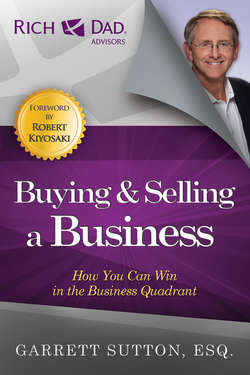Читать книгу Buying and Selling a Business - Garrett Sutton - Страница 20
На сайте Литреса книга снята с продажи.
The Seller
ОглавлениеAs a seller, you are looking for a buyer. Ideally, you want to find a buyer who does not compete for your ongoing business, presents the least hassle after the sale and offers you top dollar. Since there is a chance you may end up working for him or her after the sale, during the negotiation period, you will also need to evaluate if he or she is someone with whom you can work.
Keep your ego out of the sale. Every buyer will find flaws with your company – that’s the buyer’s job. A new buyer needs to know how to improve the business. He or she will want to do things differently than you to make the business more successful. Don’t take it personally.
In our last case, Paris wanted a $50,000 reduction for a lack of information technology infrastructure. This offended Richard, whose ego and identity were intertwined with the business. A more dispassionate seller may have resolved to increase their bottom line selling price by $100,000 to cover the asked-for $50,000 reduction, and privately punish the buyer another $50,000 for even making such a reduction demand. Remember, he who cares least wins.
The sooner you can let go of your personal feelings about the business, the sooner real negotiations can begin, and the sooner you can win. Ideally, you should be letting go before the sale even gets under way. After all, the best deal for the company is not always the best deal for your ego. Separate the two and you’ll stand a much better chance of winning.
Remember that the buyer is looking to the future and the seller to the past. As a seller, you can use your hindsight to help the buyer see how rosy the future can be. The rosier the past, the rosier the future. Good, current, thorough books go a long way toward the fertile fields of a profitable sale.
You need to be able to not only understand what makes your company a viable purchase, but also how to present it in such a way that others can see its benefits as well. Of course, all financials should be clear and current, but other documents, such as updated policy manuals, will help as well. You should formalize all company policies and procedures. The more you have in writing the easier it will be to overcome the objections of the buyer (or worse yet, the buyer’s attorney) that the company has no substance. If you know you’re going to sell your business in two years but haven’t got around to “getting everything down”, do so immediately. You want age on the documents. The fact that they were prepared one month prior to negotiations for a sale may be used against you.
Some useful documents include:
1. A Company policy manual for employees. Vacation policy, sick leave, overtime, insurance, dress code – all these should be written down. (But be careful not to create a contract of employment with your employees which can later form the basis for employee litigation. Work with your attorney to draft the policy manual in a favorable manner to your company).
2. Work procedures manual – detailed, step-by-step instructions on how various tasks are performed.
3. Customer agreements. Get it in writing. A good, standardized agreement can save everyone from many headaches, including you. If there are issues involving performance, a good contract will provide a roadmap on how to move forward.
4. Current bylaws and articles of incorporation filed with the state.
5. Minutes for every major corporate decision.
6. Current corporate handbook with minutes from required meetings of both directors and shareholders. (See my book “Start Your Own Corporation” on the importance of corporate minutes.)
7. Current registered agent information.
8. All tax returns.
Make sure all documents, especially manuals and policies, are current. Discrepancies between what you say and what you do could lead to perceptions of integrity problems. Such perceptions can muddy the waters for the rest of the purchase process.
It is best to be forthcoming with all the facts as you know them. If you have doubts about disclosing something, disclose it. Sellers are never sued for telling too much, only for not telling enough. Lawyers love bringing cases involving misrepresentations on the sale of a business. Look at it from their perspective. They’ve got you as a seller, who has complete information about the business. They’ve got their client, the buyer, who is a complete innocent, knows nothing about your business but is willing to pay you millions of dollars, based on your representations. Because you, the seller, are about to receive millions of dollars from the buyer, you owe that buyer an ethical and moral duty to disclose everything, warts and all. And if you don’t, if you fail to disclose one little thing, that lawyer is going to paint you as a corrupt and unethical executive, the kind of one-dimensional businessman villain you see on poorly-written television shows, out to take advantage at every turn of innocent and good people everywhere. And guess what? The jury in your case will eat up this portrayal, as they always do, and you’ll lose. The lesson here is to disclose everything.
